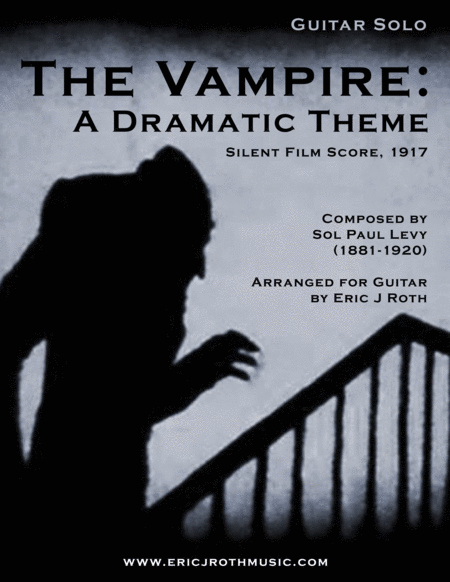Solo Guitar - Level 4 - Digital Download SKU: A0.914739 Composed by Sol Paul Levy (1881-1920). Arranged by Eric J Roth. 20th Century,Romantic Period. Individual part. 6 pages. Eric J Roth #4593125. Published by Eric J Roth (A0.914739). 6 pages (2 pages of music) formatted for 8.5x11 printing.Sol Paul Levy, born in Chicago, Illinois in 1881, was a composer, arranger and performer of silent film music. He attended All Hallows College in Dublin, Ireland and served as first clarinetist in bands led by John Philip Sousa and Arthur Pryor. Levy led the foreign orchestrating department for Victor Records â which was the first music company to produce the disc record â and was a founder of Belwin Music. Levy compiled a series of photoplay cues for piano that was published in H.S. Gordonâs 1914 Motion Picture Collection. He also wrote songs, the most famous of which was That Naughty Waltz. Sol Paul Levy died in New York in 1920. During the Silent Film Era (1896-1936), showings usually featured live music, which helped to provide dramatic and emotional cues for the audience. The first public silent film shown in 1895 was accompanied by a guitarist. Soon after, films were commonly accompanied by either a pianist, organist, or chamber orchestra. Accompanists often improvised or compiled music from the classical, theatrical or popular repertories using a cue sheet identifying the effects or moods to be conveyed. While some films produced full scores or detailed cue sheets containing excerpts of music unique to that film, a repertoire of generic music soon developed to provide accompanists with music that they could adapt as needed. With titles such as Dramatic Conflict, Dramatic Tension, Heavy Mysterioso, and Weird Oriental Theme, Sol Paul Levyâs scores clearly served this purpose. The Vampire: A Dramatic Theme, composed in 1917, could have been easily adapted to any of the more than twenty films about vampires that appeared between 1909 and 1930. The score exists in three versions: one for small orchestra with piano conductor, one for chamber orchestra without piano, and one for chamber orchestra without timpani. Instruments included piano, flute, clarinet, two cornets, trombone, two timpani, two violins, viola, cello, and bass. Despite being composed for small orchestra, the piece, composed in A minor, is well suited to the guitar once instrumental and octave doublings are removed. While a solo guitar cannot produce the power and volume of a chamber orchestra, it certainly can evoke the intended mood. Except in a few instances owing to the limitations of the guitar, all original dynamic markings have been retained. All fingerings, of course, are editorial. Please note that some of the fingerings in the score may differ than those used in the linked YouTube Video.
